Myalgic Encephalomyelitis (ME) is a neuroimmune illness that affects 1 in 4 people severely, according to the Action for M.E. I am one of them. In the United Kingdom, there are 250,000 people — children, young people and adults — living with ME.
My mornings start usually feeling more tired than when I went to bed and despite living my day permanently exhausted, some nights I can find myself hit with insomnia. But with changes to my daily routine and things like not drinking caffeine after 4 p.m., my sleep is much better these days.
There is no “typical” day for me as I can never predict one half hour to the next. One moment I can be typing a story for The Mighty, then I can be hit with a brick wall of fatigue and exhaustion rendering me almost catatonic and unable to function. The unpredictable nature of ME can be hard to deal with and I’ve had to learn my limits. I now feel less guilty with cancelling plans, letting things go and prioritizing and learning that it’s OK to do things another day. Thankfully I have understanding friends who are OK with me cancelling plans or taking a while to reply to messages or letters.
I have a schedule or “daily plan” for my day which my occupational therapist and I put together. We built up my plan gradually to what it looks like now. I find it to be really beneficial and I find it helps with with pacing (an important tool to learn if you have a chronic illness). I find having a structure to my day really beneficial as it gives my day purpose; not only does it benefit me physically, but with my mental health too.
When you have ME you have reduced levels of energy. People often think that energy involves something physical, but cognitive activities like reading and emotions use up energy too. Things like having a conversation, listening to an audiobook, getting upset or being in pain all use up my energy reserves.
Another key feature of ME is something called Post-exertional malaise, or PEM for short, which is the fatigue and flare-up of symptoms you feel following an activity or when you’ve overdone things. When I’ve overdone it or when I’m experiencing PEM, my immune system flares up. Another name for PEM I’ve discovered is PENE, or Post-exertional neuroimmue exhaustion, which for me is a perfect fit to how I feel when my ME flares up.
I also experience “brain fog” where my brain starts to work in slow motion and I struggle with things like putting words together or having speech difficulties remembering something I was told five minutes earlier. I will also have difficulty concentrating and focusing on tasks like watching a television program or reading. I pretty much have this element of ME constantly, but it varies in severity; sometimes it’s mild and I can function near-normally, other times I find it challenging to function.
I don’t often leave the house and when I do it’s usually for essential medical appointments that cannot be done at home, or the rare “treat” out like to get a coffee or go to a favorite store or a garden center.
When I do leave the house I have to use my wheelchair because I can’t walk very far. For me walking is very tiring and it uses up too much energy and it flares up my symptoms and my balance isn’t very good (also not helped by my other neurological disorder). Even in the house I have to make minimal journeys and I spend most of my day in bed or on the sofa. I also have to spend a lot of time reclined as secondary to my ME, I have autonomic problems and a secondary condition called POTS, or Postural Orthostatic Tachycardia Syndrome), as well as Orthostatic Intolerance.
I’m also sensitive to light which is painful so I wear tinted lenses. Noise is painful too and as I type this I have noise cancelling earplugs or headphones in just to dim the hubbub of the house (and currently the sound of the dishwasher and television). When my ME is at it’s worse I can also be sensitive to touch and smells. The duvet over me can feel like it’s crushing my body and smells can trigger migraines. Hypersensitivity is again another symptom of my ME.
For me this coronavirus lockdown has been fairly easy as I lived my life in social isolation before the lockdown. For people like myself with severe ME this lockdown isn’t a temporary measure.
I’ve learned to enjoy my own company, but I do get lonely. I’m thankful that I’m not completely bed bound like others. I can spend my time in other parts of the house which breaks up the monotony of the day. I personally use the term “sofa bound” as I can just about make it from my bed to the sofa or reclining chair, and spend my time there just so that I’m not spending all day in bed. There are days however when I am not able to get out of bed.
Despite the challenges of living with severe ME I’ve built a life I can live with. I’ve found ways of interacting with people from a distance and activities that I can do and enjoy. I’ve also found a balance to my day which makes life tolerable and manageable.
I try my hardest to hold on to hope. I hope that a cure for ME can be found one day, or at least better understanding of this illness and the development of some kind of better treatments for it. Personally, I hope that I can return to some form of education and I miss my voluntary work too. I think it’s important to hold on to hope for anyone living with a chronic illness because it can help you keep going even on your worst days.
Photo credit: Beli_photos/Getty Images


